- Home
- Naguib Mahfouz
Heart of the Night Page 2
Heart of the Night Read online
Page 2
“You have mentioned your mother’s hand many times already,” I said.
“She would hold my hand or I would hold hers, and we would wander together in the alleys and souks.”
“To shop or for pleasure?” I asked.
I was getting used to his live soul among the ruins and the memories. He seemed happy and grateful for the dinner, and for the hash he smoked, and for having an attentive listener for his story.
He said, “Sometimes I try to remember my mother’s image but I can’t see it. How tall was she? I was naturally much smaller than her and always looked up whenever I spoke to her, but this in no way indicates anything or measures her height. I have no idea about her weight either, or the color of her eyes or skin. I have a rather vague idea of subdued tones and movements. I remember strong emotions, smiles and laughter, and reprimands that were closer to visions from dreams. I can, however, affirm that she was beautiful, and had it not been for her beauty the tragedy would not have happened. I remember a comment made by our neighbor on a forgotten occasion: ‘Hey, Jaafar, son of the beautiful woman!’ But she did not live long enough to give me time to protect her image from destruction. Only the memory of her hand has stayed with me. To this day I feel her touch, her pressure and her tugging, and when she let go, as we walked from one place to the other across covered and uncovered alleys, among hordes of men and women, donkeys and carts, in front of shops and saints’ tombs and monasteries. She took me to the gatherings of the lunatics and the fortune tellers, the sweet vendors, and the toy sellers. On those trips, I wore a gallabiya and a colorful hat decorated with an amulet.
“My mother’s conversations were varied and contained a poetic tone that she adopted while talking with all creatures, each in its own language. She would address God Almighty, the prophets and the angels, and the holy men in their tombs. She even talked to the jinn, the birds, inanimate beings, and the dead. She would interrupt her conversations with moans about her bad luck. The world around us was alive, aware of those conversations that it received and returned and participated in through its hidden will in our daily life, without discrimination between an angel and the door of a saint’s tomb, between the hoopoe and the gates of old Cairo. Even the jinn mellowed to her magic words and this saved me from numerous dangers.”
Noticing his serious demeanor, I could not help but laugh. Surprised, he asked, “Why do you laugh?”
I said apologetically, “You are narrating a dream that you can now interpret and explain.”
He replied, “Do not think you know the world half as well as I know it.”
“Is that so?”
“I am a sea of knowledge and I say that without boasting.”
“But you do not differentiate between truth and fiction.”
He explained, “There is no ‘truth and fiction,’ but different kinds of truths that vary depending on the phases of life and the quality of the system that helps us become aware of them. Legends are truths like the truths of nature, mathematics, and history. Each one has its spiritual system. Let me give you an example. One day my mother took me to visit my father’s tomb, located in an open area among the tombs of the poor. She addressed him, saying, ‘Your wife and son greet you and ask God to have mercy on you, most beloved and generous person. I complain to you about my loneliness and my misery. Pray God for us, oh beloved.’ I then stuck my ear to the wall of the tomb and heard moaning and words that I repeated to my mother. She told me, ‘You are blessed to the Day of Judgment.’”
“What did your father tell you?” I asked.
He replied, “You are not qualified to believe me and therefore I won’t tell you.”
I had a feeling he was covering up his playfulness with an appearance of harsh seriousness, or that he wanted to surround his legend with an appropriate atmosphere to satisfy his heart’s nostalgia. I mumbled, “For every learned man there is someone more learned than him.”
“Our world was alive, throbbing with desires, feelings, and dreams. It was a mixture of seriousness and joking, joy and sadness; and all—humans, jinn, animals, and inanimate objects—equally shared in relationships of understanding.”
“But do you understand all that?” I asked.
“Completely, passionately, and doggedly.”
“Weren’t you overcome with fear?”
“Sometimes, but I soon acquired tools of defense and attack and became the master of the world. One evening I was playing with the lemons spread around the water jugs on the windowsill, when I suddenly saw the head of a being level with the window, looking at me from the street. His eyes were alight in the dark and his legs were planted in the ground. I was troubled and moved away, falling on my back. My scream ripped the silence of the night. I later learned that the encounter between a human and a jinn should not take place in this manner. My mother told me that it was high time I memorized the Samadiya. As for the jinn of our house, those that lived in the storeroom, they were inclined to joking and were incapable of any serious harm. They were in the habit of mixing cheese with honey or hiding the clarified butter for their own use. Sometimes they extinguished the light of the lamp carried by people at night. Their worst jokes, however, consisted of changing dreams into nightmares.”
“Can you give me an id ea about how they looked?” I asked.
“No, you are not predisposed to believe,” he said. “Moreover, the jinn disappear from a person’s life at the end of the time of the legend. He quickly forgets them and even denies their existence, though he encounters them daily in new images of human beings. In such situations they commit serious evil and cause great harm. You insist that the jinn are a mere superstition. On the other hand, I had the good luck of seeing the holy light on Laylat al-Qadr, the night of destiny, while sitting on my mother’s lap looking at the sky! A window opened and out of it came a bright light that dimmed the light of the stars.”
I laughed and told him, “It is said that only those who are destined for a life of happiness see the light on Laylat al-Qadr.”
He laughed as well. “Touché! You beat me this time, but only to an extent. It is true that I am the example of extreme wretchedness, but what counts is how all this will end. The end is still unknown and I might find the answer in paradise. I happen to have a long history with paradise. My mother used to talk to me about it as if she had been there. I fell deeply in love with it, my mind spellbound by its vision. It became my fascinating dream, the magical paradise where one could see, hear, and talk to God, a garden with rivers, music, and eternal youth.
“But let’s go back to my mother’s conversation and how she managed to live after my father’s death. I asked myself this question but could not answer it. We used to leave our house every day, visit the saints’ tombs and the shops, buy whatever we needed, and then return home, where my mother busied herself with housework, while I went to my earthly paradise, among the cats and the chickens. Sometimes our neighbor visited us. I did not have relatives and neither did my mother. To this day, I have not found out if she had money. She dressed in black after my father’s death and cried whenever she was alone. I often discovered her crying. And finally I understood the relationship between her crying and my father’s disappearance.
“‘Don’t you say that my father is in God’s hands?’ I asked her. She nodded approvingly. ‘Why do you cry then?’ I asked.
“‘I know it is wrong to cry, Jaafar, but tears flow despite myself.’
“This did not discourage me from pursuing my daily adventures. I would proceed joyfully, collecting eggs, chasing mice, and defying the jinn. My adventures lasted for a whole year after my father’s death, and then I became attracted to the stories told at the sound of the rabab in the coffeehouse located under my window. I listened to them with great interest, as much as I could understand them, and I saw fights break out between the supporters of the different heroes of the legends. From the same window I watched bullies fight in weddings, and my admiration for them equaled my admiration for the jin
n. I dreamed long of becoming a bully in case I failed to become a jinn.”
“Have any of your childhood dreams been fulfilled?” I asked.
“Do not make fun of me, and be patient. I want to talk to you about love in the time of the legend.”
“But the time of the legend is not the time of love!”
“I experienced love at age six,” he said. “I liked to sit in the midst of girls during Ramadan nights. The only serious beating my mother gave me was because of love, when I had seduced a girl my age and took her to a wooden box and pulled down the cover. No sooner had I settled down than I was surprised by someone removing the cover. When I looked up, I saw my mother’s shocked look and felt her braid touch my face. By the way, it was a very long braid and I used to play with it whenever I could. I would undo it, tie it, and twist it like a rope. My mother was undoubtedly beautiful, and, as I have already told you, were it not for her beauty, the tragedy would not have happened in the first place.”
“Tell me about childhood love,” I said.
He laughed. “It seemed like an aimless pastime, but I do remember that it was filled with sharp reactions. It was almost like being drunk.”
“This is abnormal!”
“I am not a moralist, but I can assure you that sex was not an overpowering factor in my life. It played a decisive role during a specific time only. During my childhood, however, it contributed in its own limited way to the creation of the legend, but the legend received an unexpected and fatal blow. One day I woke up alone without my mother’s help, and I became aware of that when I saw her deeply asleep, lying face down. I was happy to have the opportunity to wake her up for the first time. I placed my mouth close to her ear and called her name a few times, but to no avail. She did not respond. I shook her gently, calling her at the same time. Gradually my voice rose and I shook her more strongly, but received no response. I went on stubbornly trying to wake her up, my voice filling the room. I was desperate, and ended up leaving the room. I took a pomegranate from a dish and went up on the roof. Peeling the fruit, I ate its amber seeds and gave the bitter part to the chickens.
“I saw our neighbor. We talked, and the conversation turned to my mother and the way I had left her in her room. The neighbor questioned me carefully and finally asked me to open the apartment door for her. She rushed to my mother’s room, bent down, and then struck her breast with her hand, shouting, ‘What a calamity! Oh Umm Jaafar!’ She came to me, lifted me, and held me against her chest. Then she took me to her house. Her behavior saddened and oppressed me, reminding me of similar behavior when my father had disappeared for good. I cried, saying, ‘I want my mother, I want my mother.’ I spent two miserable days in our neighbor’s house. They were the worst days in the time of the legend. At the end of the second day the neighbor calmed me down and said, ‘Do not worry, Jaafar, God is merciful and compassionate.’
“I said, desperate, ‘I understand, my mother went to be with my father.’
“Her eyes filled with tears and she whispered words of encouragment. ‘God is with you. He is the father and the mother. He is everything.’
“Her husband intervened, saying, ‘Something must be done, even if it means going to the government.’
“His wife replied, ‘Even a stone would feel sorry for him.’
“Days passed while I lived absentmindedly, lost in my thoughts, until the neighbor announced cheerfully, ‘Rejoice, my dear, God is merciful. You will be going to your grandfather.’
“I did not understand anything she said. I was hearing the word ‘grandfather’ for the first time.”
4
Surprised, I asked him, “For the first time?”
“Yes, for the first time.”
I asked again, “He was never mentioned during your mother’s lifetime?”
“Never, though he lived in the same neighborhood.”
“Why did she keep you in the dark about him?”
“Maybe because she was upset with him. Anyhow, our neighbor explained the relationship to me and told me that he was my father’s father. His house was not too far from Margush, and in a way it was a familiar place, as my mother and I often walked by its high walls on our way to al-Hussein.
“I remember that I once asked my mother about the wall that stretched up quite high, like a mountain in front of the vaulted roof of the judge’s house. She explained briefly and hastily, saying, ‘It is a prison where criminals spend their lives in darkness.’
“The wall was not isolated from the other houses, in keeping with the tradition of design in popular neighborhoods, where the houses of the poor and the rich are adjacent. Nothing could be seen of the house or its garden. The only thing visible was the wall, which overlooked the treasury. It was a stone wall, long and high, truly like a prison wall or the wall of a citadel, and its door opened onto a dead end.
“I saw the garden for the first time when we crossed the gate. I had no knowledge of gardens, had not even seen a plant, except for a palm tree in the square where the judge’s house was located and a cactus tree in the cemetery. My ears filled with the singing of a nightingale and the chirping of other birds. The branches were filled with those multicolored birds flitting around. I saw a flock of pigeons hover over a tower behind a vine-covered trellis. The tower overlooked a creek that crossed the garden from one side to the other. A gardener holding a basket in his hand was standing in the middle of the garden, his legs sunk into the ground up to his calves. I was overwhelmed to the point of intoxication by the mixture of heavenly scents that invaded my nose. Mesmerized, I could hardly contain myself from expressing my enchantment at the top of my voice. I walked down a path bordered by colorful flowers, on my way to the salamlik.
“The neighbor squeezed my hand and whispered in my ear, ‘Jaafar, this is your new home.’
“I was totally bewildered. I saw my grandfather in the middle of the salamlik, sitting on a sofa with arabesque designs carved into its high back. My neighbor had a short talk with my grandfather, kissed his hand, then left. I found myself alone with my grandfather, not yet recovered from the magic of the birds, the flowers, and the stream; and the profound sorrow in my heart had not subsided. My grandfather sat cross-legged, wearing a large white robe and wrapped in an embroidered shawl, his head covered with a white cap. He had a long, thin face, brown skin, a large forehead, and a long, proud nose. His look was peaceful, and his white beard reached his upper chest. We exchanged a glance, and I did not see anything frightening on his part. He appeared quite old to me, but had a noble and distinguished demeanor. He looked like a worthy owner of that fascinating garden.
“I stood at some distance from him, neither close nor far. I was wearing my striped robe and my embroidered cap with the talisman attached to it, and colorful slippers. I carried a package containing my few belongings. He looked at me for so long that I was overcome with the urge to run away. Then, as if he had guessed my reaction, he smiled and directed me to come closer. I told him eagerly, ‘I want to go back to my mother.’ He held out his hand, and I walked to him and shook it. I was suffused with an urge to cry, but I controlled myself and did not shed a tear. His touch filled me with warmth.
“He said gently, ‘Welcome,’” and sat me beside him. ‘You are in your house. Do you like the garden?’
“I nodded eagerly to express my admiration, but he asked me to speak up. ‘Talk. I like words.’
“I mumbled an inaudible ‘Yes.’
“My grandfather asked me if I knew who he was and what being a grandfather meant.
“‘My father’s father,’ I said.
“‘Do you believe it?’ he asked.
“‘I do.’
“He asked if I remembered my father.
“‘He used to carry me to see the mahmal,’ I explained, ‘but I remember my mother.’ I then broke into tears, but he tapped me on the back and asked if I remembered something else about my father.
“‘I visited his tomb,’ I said.
�
��He turned his face away from me, then asked, ‘What is your name?’
“‘Jaafar.’
“‘Jaafar what?’
“‘Jaafar Ibrahim.’
“‘Jaafar Ibrahim Sayyid al-Rawi. Repeat after me.’
“I did as he asked, and he went on questioning me. ‘Who created you?’
“‘God.’
“‘Who is your prophet?’
“‘Prophet Muhammad.’
“‘Do you pray?’
“‘No.’
“‘What have you memorized from the Quran?’
“‘Say: He is God, the One.’
“‘Haven’t you memorized the Fatiha?’
“‘No.’
“‘Why did you start with “Say: He is God, the One”?’
“‘Because of its power to control the jinn,’ I said.
“‘Do you deal with the jinn?’
“‘Yes. Many of them live in our storeroom and they fill Margush by night.’
“‘Have you seen them with your own eyes?’ he asked.
“‘Often,’ I said.
“‘You are lying to your grandfather.’
“‘I saw them and dealt with them,’ I insisted.
“He gently passed his finger over the contour of my face. I felt close to him and got over my nervousness.
“‘Do not lie, Jaafar. I do not like lies.’
“‘I am telling the truth.’
“‘Look with your eyes and do not imagine what does not exist.’
“‘Grandfather,’ I said.
“He looked at me inquisitively.
“‘Why haven’t you ever visited us?’
“He turned his gaze in direction of the garden. ‘Your grandfather is old, as you can see.’

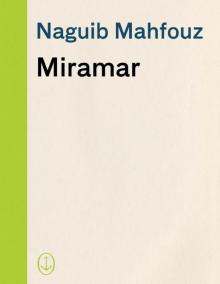 Miramar
Miramar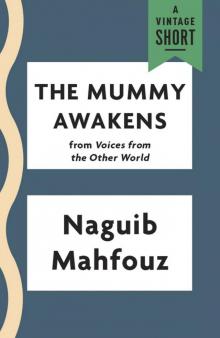 The Mummy Awakens
The Mummy Awakens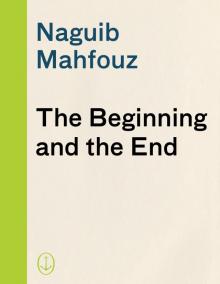 The Beginning and the End
The Beginning and the End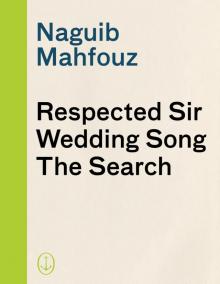 Respected Sir, Wedding Song, the Search
Respected Sir, Wedding Song, the Search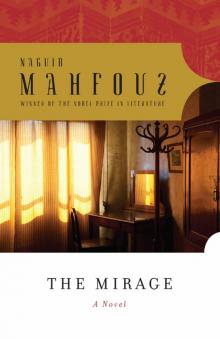 The Mirage
The Mirage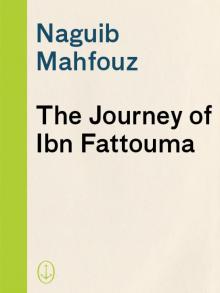 Novels by Naguib Mahfouz
Novels by Naguib Mahfouz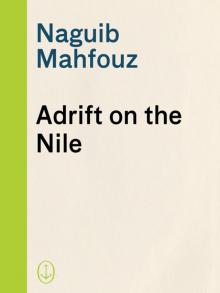 Adrift on the Nile
Adrift on the Nile Karnak Café
Karnak Café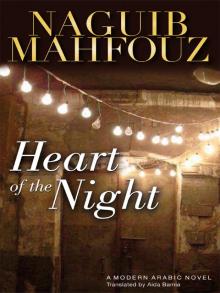 Heart of the Night
Heart of the Night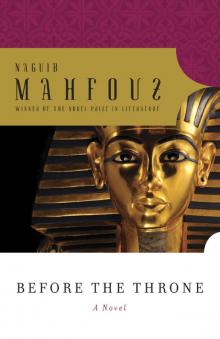 Before the Throne
Before the Throne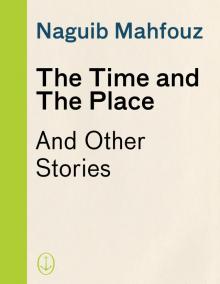 The Time and the Place: And Other Stories
The Time and the Place: And Other Stories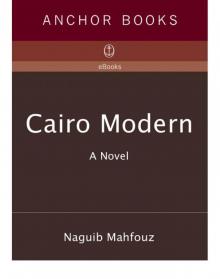 Cairo Modern
Cairo Modern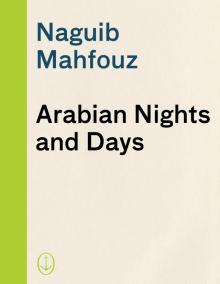 Arabian Nights and Days
Arabian Nights and Days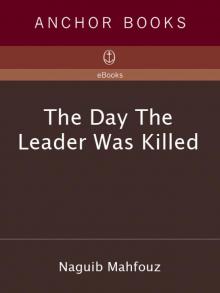 The Day the Leader Was Killed
The Day the Leader Was Killed Morning and Evening Talk
Morning and Evening Talk Three Novels of Ancient Egypt Khufu's Wisdom
Three Novels of Ancient Egypt Khufu's Wisdom Akhenaten: Dweller in Truth
Akhenaten: Dweller in Truth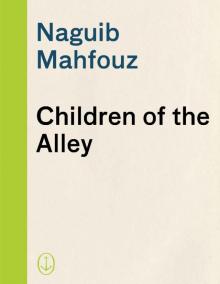 Children of the Alley
Children of the Alley Voices From the Other World
Voices From the Other World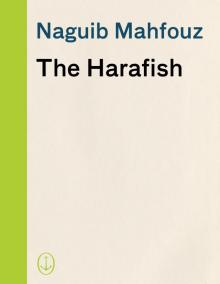 The Harafish
The Harafish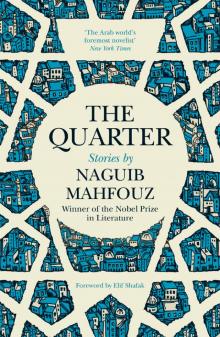 The Quarter
The Quarter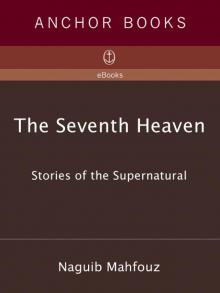 The Seventh Heaven: Supernatural Tales
The Seventh Heaven: Supernatural Tales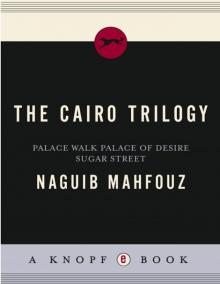 The Cairo Trilogy: Palace Walk, Palace of Desire, Sugar Street
The Cairo Trilogy: Palace Walk, Palace of Desire, Sugar Street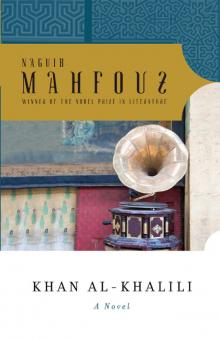 Khan Al-Khalili
Khan Al-Khalili Three Novels of Ancient Egypt Khufu's Wisdom, Rhadopis of Nubia, Thebes at War
Three Novels of Ancient Egypt Khufu's Wisdom, Rhadopis of Nubia, Thebes at War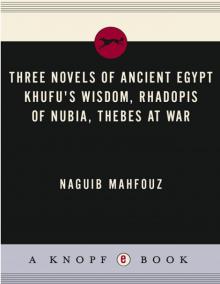 Three Novels of Ancient Egypt
Three Novels of Ancient Egypt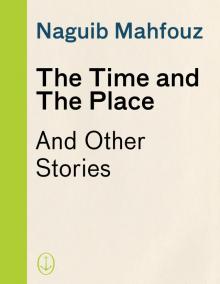 The Time and the Place
The Time and the Place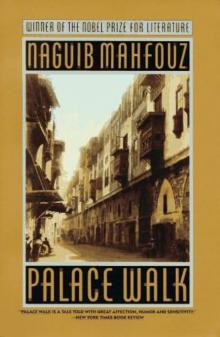 Palace Walk tct-1
Palace Walk tct-1 Akhenaten
Akhenaten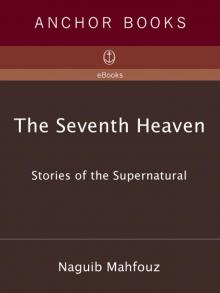 The Seventh Heaven
The Seventh Heaven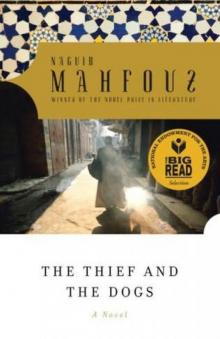 The Thief and the Dogs
The Thief and the Dogs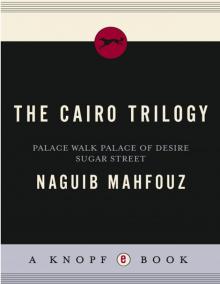 The Cairo Trilogy
The Cairo Trilogy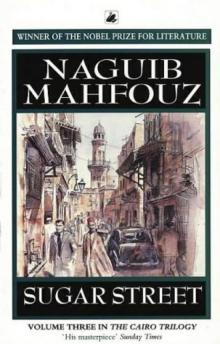 Sugar Street tct-3
Sugar Street tct-3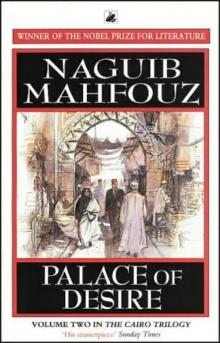 Palace of Desire tct-2
Palace of Desire tct-2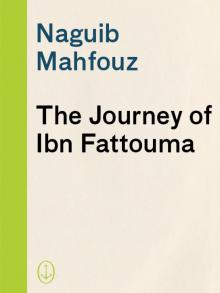 The Journey of Ibn Fattouma
The Journey of Ibn Fattouma